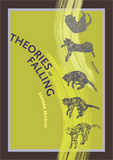October 25, 2008THEORIES OF FALLING By Sandra Beasley
Review by Jeremy Voigt
THEORIES OF FALLING
By Sandra Beasley
New Issues Press
The College of Arts and Sciences
Western Michigan University
Kalamazoo, MI 49008
ISBN:-10:1-930974-74-4
64 pp., $14.00
http://www.wmich.edu/newissues/
Theories of Falling is a book about the body and the spirit. The wordplay in the title sets up poems that are concerned with both the spiritual fall of man and the physical pains of living. The spiritual fall works as a central metaphor (and literally in titles such as “The Puritans,” “The Angels” and “The Flood”) as the persona behind the poems probes childhood and dysfunctional adult relationships. Beasley also presents the pleasure-pain principal with tremendous energy in poems full of strong images and wit.
In the title poem Beasley meditates on the cat’s ability to turn and land on its feet:
Rotoscope cameras have captured the cat as he swivels
first head, then spine, aligns his hind legs, arches
for impact. He turns this helix over and over
until the ground rises to meet him. He bounces.
The next single-line stanza introduces the human connection:
We do not bounce.
This poem comes just beyond the midway point of the book and seems to work as a hinge connecting the first section of memory poems, personal narratives of growing up and a long meditation on some of the most severe allergy suffering I’ve ever personally read about to poems with a broader scope of subjects.
Whether she is writing about allergy suffering or a philosophical analysis of American culture, Beasley insists on surprise and humor of top order. Her humor is witty, rich, and has the tone of a weary voice that has come to the conclusion that one must laugh at oneself in order to deal with the pain of life. For example, most of the second stanza of “Allergy Girl” describes young parents struggling with perhaps the most nerve-wracking situation a parent might face: an infant who cannot eat without becoming sick.
My parents agree on one rule: Don’t break the baby.
They pour quarters into the arcade game of adulthood,
working the mechanical claw right, left, right, back,
aiming for the stuffed bear, missing. A clutchof cheesecake. A buttermilk biscuit. Each time
my lips swelling, breath skipping. They pace the E. R.
Did we break the baby?
The fourth stanza continues the pace and repetition:
My father perfects Shhh, it’s not that bad, you can breathe.
Breathe. They cradle me in Benadryl. That’s the secret
of marriage: bleary silence in white rooms. Too busy
not-breaking me to take the wrecking ball to each other.
Beasley moves from these kinetic narratives to more philosophical meditations in the second half of the book, though the humor and speed does not diminish. Looking at the overall narrative of the book, the second section of the book reads like an adult persona who stretches her emotional life in extreme ways as if intentionally testing her mortality—a tendency that is clearly connected to the first section in which, as an infant with severe health problems, her life is literally at stake. The title poem ends with this couplet:
Jump, for God’s sake.
Jump like your life depends on it.
The poem “The Angels” takes the perspective of angels looking down on America and attempting to analyze or interpret our culture. The result is both humorous and disturbing:
They never tire of blinking down at the Americans—
our surfboards, machine guns, our dancing hamsters.
The way we shower every day, then rub more oil into our skin.
This poem, and perhaps the whole tone of the second section, seems like a response to the Frank O’Hara lines: “I am ashamed of my century / for being so entertaining / but I have to smile.” And Beasley’s poems seem O’Hara-ish in their momentum, humor, and conversational tone; their unpretentious familiarity is compelling and engrossing. This is a book with many pleasures and one well worth the read.